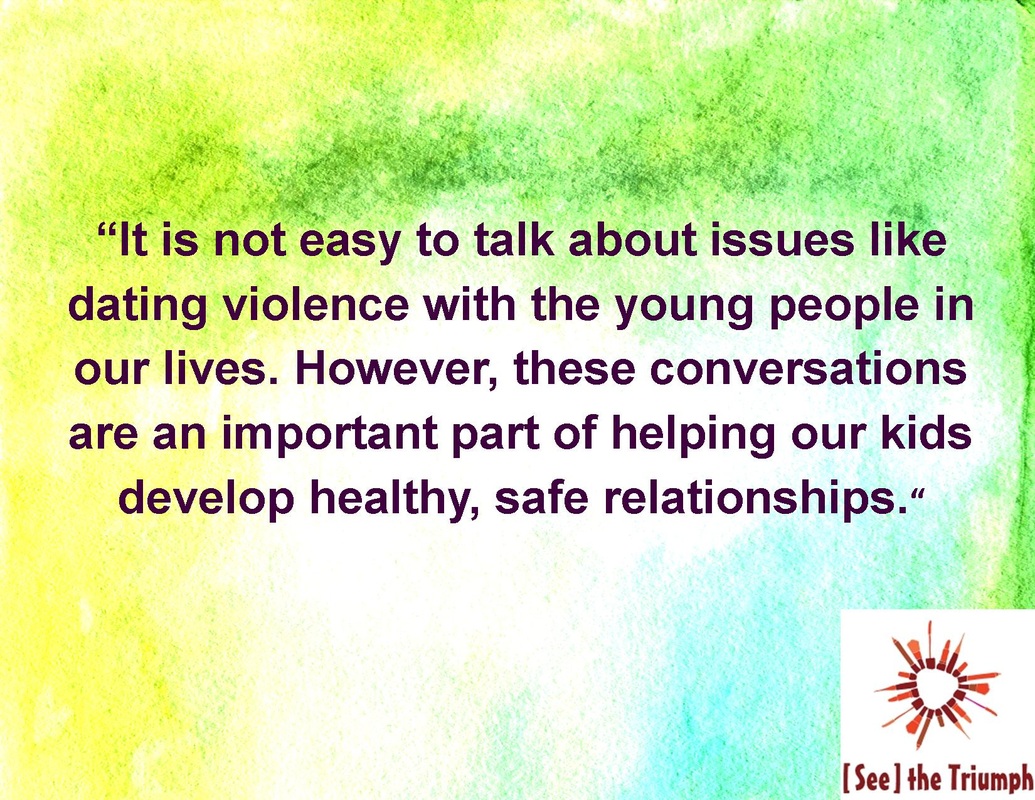|
By Christine Murray, See the Triumph Co-Founder
A recent CBS News/48 Hours story addressed the 2011 murder of a Massachusetts teenager by her ex-boyfriend, describing the murder as an incident of “breakup violence.” In David Bauder’s U.S. News & World Report story on the show, Bauder wrote that “some experts said they've been startled over the past few years...about the number of teenagers who say they've seen abusive relationships.” The numbers are shocking, indeed. According to Loveisrespect.org, each year almost 1.5 million high school students in the United States are physically abused within a dating relationship, and ⅓ of U.S. teenagers experience some form of dating violence, including physical, sexual, or emotional abuse. And yet, teen dating violence remains a difficult topic for parents, educators, and other concerned adults to talk about with the young people in their lives. Loveisrespect.org also reports that over 80% of parents either do not think that teen dating violence is an issue for teens, or they do not know if it is. It’s time we start talking more about this important issue, both privately within the family and in public settings, like schools and community organizations. According to the U.S. Department of Justice, females between the ages of 16 and 24 are at the highest risk for intimate partner violence. We simply cannot wait until youth enter college or adulthood to begin to educate them about healthy relationships--it could be too late. As a parent, I know that it can be difficult to imagine that one’s own children could be at risk for the challenges that we often read about in the media, such as bullying and drug use. And yet, by not talking about these issues with our children, we are not equipping them with the knowledge they need to navigate the challenges of life as a child and teenager today. In addition, when we open a conversation about challenging topics like teen dating violence, we can open a door to let our kids know that we are here for them if they ever face these issues themselves, or if they know someone else who is struggling. I offer the following three steps for starting conversations about dating violence with the kids in your life: First, educate yourself about teen dating violence. You don’t need to be an expert on the topic to be able to talk with your kids about it, but if you enter into a conversation knowing a few facts about the dynamics of teen dating violence and some resources for more information and support, you’ll be better prepared to answer your kids’ questions. Some resources that may be helpful include: Second, acknowledge that this is a difficult topic to discuss. There is a big stigma around all forms of intimate partner violence, including dating violence. Acknowledging, both to yourself and to the young people you’re talking to, that this can be a difficult discussion is a helpful way to convey your openness to this conversation, even if it is hard to do. Third, open the conversation, and maintain a nonjudgmental approach to discussing the topic. You could start by saying something along the lines of, “I know that dating while you’re a teenager can be complicated, and I’ve been hearing more lately that there are a lot of teens who have violence happen in their relationships. I wanted to talk about this with you so you can know you can talk to me about this sort of thing.” Questions you might ask as the conversation moves forward include the following:
From there, try to keep an ongoing dialogue open, such that this conversation doesn’t have to remain a one-time event. It is not easy to talk about issues like dating violence with the young people in our lives. However, these conversations are an important part of helping our kids develop healthy, safe relationships. What other tips do you have for talking with kids about dating violence? Please share them in the comments section below. Comments are closed.
|
Archives
July 2024
CategoriesAll About Intimate Partner Violence About Intimate Partner Violence Advocacy Ambassadors Children Churches College Campuses Cultural Issues Domestic Violence Awareness Month Financial Recovery How To Help A Friend Human Rights Human-rights Immigrants International Media Overcoming Past Abuse Overcoming-past-abuse Parenting Prevention Resources For Survivors Safe Relationships Following Abuse Schools Selfcare Self-care Sexual Assault Sexuality Social Justice Social-justice Stigma Supporting Survivors Survivor Quotes Survivor-quotes Survivor Stories Teen Dating Violence Trafficking Transformative-approaches |
Search by typing & pressing enter



 RSS Feed
RSS Feed